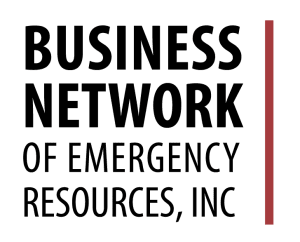 The Business Network of Emergency Resources , also called "BNET", is the result of a Federal, State and private sector study conducted in New York State during 1996-1998 known as the Joint Loss Reduction Partnership (JLRP). The study's intent was to determine the critical needs of businesses and to identify private sector critical infrastructure industries immediately after and following a major disaster. The study yielded interesting results. Rapid access by essential employees to workplaces and better communications between the government's emergency personnel and the private sector's disaster recovery coordinators were the overwhelming voids that needed to be addressed. Businesses and public emergency managers recommended that programs be put in place to mitigate these cooperation voids.
The Business Network of Emergency Resources , also called "BNET", is the result of a Federal, State and private sector study conducted in New York State during 1996-1998 known as the Joint Loss Reduction Partnership (JLRP). The study's intent was to determine the critical needs of businesses and to identify private sector critical infrastructure industries immediately after and following a major disaster. The study yielded interesting results. Rapid access by essential employees to workplaces and better communications between the government's emergency personnel and the private sector's disaster recovery coordinators were the overwhelming voids that needed to be addressed. Businesses and public emergency managers recommended that programs be put in place to mitigate these cooperation voids.
As a result, the private sector participants of the JLRP along with public sector advisers formed BNET in April 1999 as a non-profit organization to follow through on the study's recommendations. BNET's first objective was to develop an early entry credentialing program based on a common identification card for essential employees of businesses requiring early access to their workplace following an emergency event that resulted in travel or access restrictions. The highly successful Corporate Emergency Access System, known as "CEAS", emerged.
Initially piloted and adopted in 2000 in Buffalo, New York, CEAS is now the official essential employee credentialing program for businesses that are recognized by government authorities in New York City, Commonwealth of Massachusetts, State of Rhode Island, Stamford CT, Philadelphia PA, Baltimore MD, and select surrounding counties of these municipalities.
Mission Statement
Since 1999 the Business Network of Emergency Resources, Inc. (BNET), has pioneered the way to providing access control management solutions through public-private partnerships between government and business. BNET developed the Corporate Emergency Access System (CEAS), a service provided, free of charge, to any government entity to assist access control management decisions during emergency events. CEAS makes use of a standard, centrally issued credential that can be used regardless of jurisdictional boundaries. BNET provides credentialing services to private-sector businesses at a nominal cost to identify their essential employees during times of access restriction by the government.
BNET operates by encouraging its public-private initiatives between State and local governments and the business community. When governments acknowledge the CEAS credential as a means of essential private-sector employee identification, they support both business response and recovery and help sustain community lifelines during emergencies.
Our corporate purpose is to preserve the economic viability of communities by developing public-private programs to help businesses maintain or recover operations impacted by an emergency event. We relieve the government burden by developing, delivering, and managing these programs at no cost to the public sector.
Our programs not only preserve the business and economic viability but help sustain the delivery of critical goods and services to impacted communities during emergencies.
